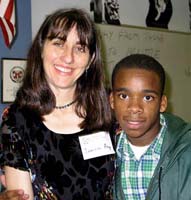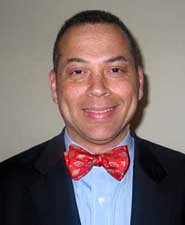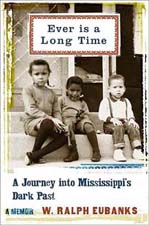Major Works
- “I Will Move On Up a Little Higher” (essay in Can I Get A Witness: Thirteen Peacemakers, Community Builders, and Agitators for Faith in Justice, 2019)
- The House at the End of the Road: The Story of Three Generations of Interracial Family in the American South (2009)
- Ever is a Long Time: A Journey into Mississippi’s Dark Past, a Memoir 2003 (Paperback, Dec 13, 2004)
- Contributed to articles in the Wall Street Journal, WIRED, the New Yorker, and National Public Radio
Biography of W. Ralph Eubanks
By Demarion Donte Jenkins (SHS)
W. Ralph Eubanks, a Mississippi writer, was born to Warren and Lucille Eubanks. He wrote Ever is a Long Time, and is also known for his work as an editor.
Eubanks was born on June 25, 1957, in Collins, Mississippi, and now resides in Washington, D.C., with his wife and three children.
Upon his 1974 graduation from Mount Olive High School in Mount Olive, Mississippi, he went to the University of Mississippi in Oxford where he received his B.A. Although he was a pre-med student at first, he soon realized that he wanted to write.
After graduation from Ole Miss, he attended the University of Michigan in Ann Arbor, Michigan in 1978 and earned an M.A in English language and literature.
In 1989, he married Colleen Delaney of Denver, Colorado. They have three children, Patrick, Aidan, and Delaney.
He has had many jobs such as Chief Copy Editor of the American Geophysical Union, Managing Editor of the APA Journals and Taylor and Francis USA, the Director of APA Books, and the Director of Publishing at the Library of Congress (1995). He now His first book is a memoir about his life growing up in Mississippi during the Civil Rights Era.
Eubanks is a recipient of a 2007 Guggenheim Fellowship from the John Simon Guggenheim Foundation.
In 2017 and 2018, he was the Eudora Welty Visiting Scholar at Millsaps College in Jackson. Eubanks participated on a panel about Race and Identity at the Mississippi Book Festival in 2018.
Eubanks lives in Washington, D.C. with his family.
Reviews
A Review of Ever is a Long Time: A Journey into Mississippi’s Dark Past: A Memoir
By Demarion Donte Jenkins (SHS)

Student Demarion Jenkins with Mississippi author Denise Ray. St. Andrews Episcopal Writers Workshop in Jackson. Photo by Nancy Jacobs
Ever Is as Long Time is a book about a small Southern town divided by racism and violence during the Civil Rights Era. The story is about Eubanks’s early life, but it is also a commentary on the social and political times in which he grew up. W. Ralph Eubanks’s father was a black county agent and his mother was a school teacher. They owned an eighty-acre farm near Mount Olive, Mississippi, where Eubanks says he remembers peach trees and red clover. Although a beautiful countryside, it was also an area of racial divide and violence because of the integration of schools and the fight for Civil Rights.
In Ever Is a Long Time he mentions events in his own life against the background of churches being burned, the murders of Medgar Evans and Martin Luther King, the forced integration of the schools he attended, and an agency created by the state of Mississippi called the State Sovereignty Commission to spy on the people in the state in an attempt to maintain white supremacy.
In the book Eubanks highlights the price many people paid for what is now taken for granted in Mississippi and elsewhere. His revelations are interesting, and his story of those who were involved in the spying activities of the State Sovereignty Commission is fascinating. Ever is a Long Time is a picture of one man coming to terms with his Southern legacy and is well worth reading by everyone.
The House at the End of the Road (2009)
Interview by E-mail with W. Ralph Eubanks – April 26, 2004
By Demarion Donte Jenkins (SHS)
1. What is your place of birth? Birth date? Parent’ names, your childhood memories, high school, college, etc.
Collins, Mississippi, June 25, 1957. Parents: Warren and Lucille Eubanks
High School: Mount Olive High School, Mount Olive, MS
B.A., University of Mississippi
M.A., University of MichiganMy childhood memories center on my 80-acre farm in Mount Olive, Mississippi. What I remember most vividly are springtime in our peach orchard, which was filled with red clover.
2. When did you know you wanted to be a writer? Was there something in particular that got your interested?
I have known I wanted to be a writer probably since my freshman essay contest at the University of Mississippi. However, I was a pre-med student, and my father wanted me to become a doctor, so I resisted the call to my writing life. But by my senior year at Ole Miss, I was writing and bound for graduate school in English language and literature at the University of Michigan, which helped solidify my desire to write and work in the publishing industry. Working in publishing was a much more reliable way to make a living than writing, so I have worked as an editor for much of my career.
3. How difficult was it to get your first book published? How did you go about it?
Because I work in the publishing industry, I know a number of editors and agents. First books are difficult to sell, particularly memoirs of someone you’ve never heard of. However, because my proposed book was about Mississippi and an agency few people knew about (the Mississippi State Sovereignty Commission), a number of editors were interested.
I went about selling the book by writing a book proposal. Nonfiction books are often sold on the basis of a book proposal, whereas fiction is sold on the basis of a completed manuscript (or on the track record of someone who has completed several works of fiction.
4. Could you give me some background information on your book?
In June of 1957, just days before I was born, Mississippi Governor James Coleman stepped before the television cameras of “Meet the Press” and was asked whether the public schools of Mississippi would ever be integrated. “Well, ever is a long time,” he replied,” [but] I would say that a baby born in Mississippi today will never live long enough to see an integrated school.”
My mother repeated these words on a cold January day in 1970 as she drove me and my sisters to their first day in an integrated school deep in rural Mississippi. What I did in my book is recapture the feel of growing up in Mississippi during this tumultuous time. In addition, I wanted to offer testimony to my family’s grace and determination against the odds that were stacked against us in Mississippi during the 1960s.
5. Who are your favorite authors?
William Faulkner, Walker Percy, Eudora Welty, Henry James, and Virginia Woolf.
6. What author do you think has influenced you the most?
Probably William Faulkner. Faulkner understood Mississippi, and I reread Faulkner as I tried to “figure out” what Mississippi was really like while I was writing Ever Is a Long Time.
7. Why did you decide to writer about Mississippi Sovereignty Commission as the subject of your book?
I decided to write about the Mississippi Sovereignty Commission because I wanted to understand what this secret organization was and explain it to my children and another generation that has no idea that Mississippi had the largest system of domestic surveillance in the country. I began writing with an eye toward writing a narrative history of the Sovereignty Commission, but quickly realized that the best way to tell that story was through the lens of a place I knew very well: my hometown of Mount Olive, Mississippi.
8. What kind of student were you in high school?
I’d say that I was a serious student: I loved to read, and I loved books and ideas. I still do. I think that is how writers are born: with a love of words and ideas.
9. Are you currently working on a new book?
I am wrestling with an idea for a new book, but am hesitant to discuss it in print.
10. How has Mississippi or living influenced your writing?
It’s difficult not to have a place as complicated and complex as Mississippi influence my writing. In Ever Is a Long Time, I move between the past and the present a great deal. I think that’s because of Faulkner’s adage that in Mississippi, “The past is never dead; it’s not even past yet.”
11. Besides writing, what else do you do?
Because I am a publisher in my day job ( I am director of publishing at the Library of Congress) books and reading are great interests of mine. However, I love distance running ( I run 5 miles every day), bicycling, 19th century architecture ( I renovated an old house once), and traveling.
12. Do you have any advice for future writers?
Read, read, read all you can. It is by reading that writers can develop their craft. And write in a journal every day, even if you only write three sentences.
13. Do you have any advice for students today?
Read, travel, and get a broad range of experiences. It is by seeing other parts of the world that one can appreciate the one you come from and write about with greater detail. I saw my hometown of Mount Olive in new ways after leaving it behind for 25 years.
Interview on Mississippi Public Broadcasting (2017)
Timeline
- Born: June 25, 1957, Collins, Mississippi
- School: Lincoln Attendance Center, Mount Olive, MS 1963-1967 (first through 4th grade)
- Carver Attendance Center, Collins, MS, 1967-1969
- Mount Olive Attendance Center, Mount Olive, MS. January 1970-May 1974
- University of Mississippi, 1974-1978
- University of Michigan, Ann Arbor, MI, 1978-1979
- Work: Chief Copy Editor, American Geophysical Union, 1980-1984
- Managing Editor, APA Journals, American Psychological Association, 1984-1988
- Managing Editor, Taylor and Francis USA, Washington, DC, 1988-1990
- Director, APA Books, American Psychological Association, 1990-1995
- Director of Publishing, Library of Congress, 1995-present
Related Websites
- W. Ralph Eubanks: Author, Writer, Essayist (author’s website)
- W. Ralph Eubanks, director of the Publishing Office at the Library of Congress, discussed his new memoir, “Ever is a Long Time: A Journey Into Mississippi’s Dark Past” (Basic Books, 2003), on Wednesday, Sept. 17, at the Library of Congress. Site includes video of speech.
- Home page for the author with biography is here.
- Ever Is a Long Time: Book Review. Barbara Bamberger Scott. 2003 <http://www.curledup.com/everisa.htm>.
- Read the first chapter of Ever Is a Long Time.
- Trent Lott’s statements in honor of Strom Thurmond as a classic example of the right wing’s true beliefs discussed in article by Eubanks called “I Know What He Means.”
- Book Page reviews book in Recalling a Painful Era.
- Webcast on The House at the End of the Road. Library of Congress
Bibliography
- Eubanks, Ralph W. Email Interview. 26 April 2004.
- Eubanks, Ralph W. Ever is a Long Time. New York: Basic Books, 2003
- Eubanks, Ralph W. ” Ever Is a Long Time: A Journey into Mississippi’s Dark Past: A Memoir <http://www.curledup.com/everisa.htm> 2003 . Scott, Barbara Bamberger. “Mo’nt Ollie.”


